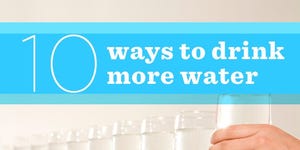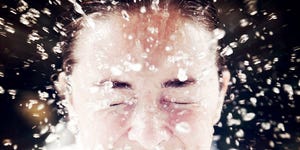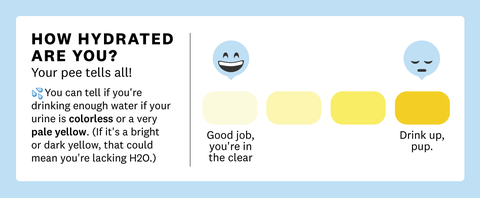Home » Health News »
Your Zip Code Might Affect How Much Water You Should Be Drinking
“Stay hydrated!”
It’s a phrase you’ve likely heard countless times from physicians, dietitians, coaches, and even your mom. Although this is sound advice, it’s often easier said than done. As a dietitian, I provide hydration goals for individuals. But it’s not so cut and dry for everyone. The amount of water you should drink depends on a variety of elements, making a seemingly simple request turn into a somewhat complex response. Let’s break it down.
What about that 8 x 8 rule?
You’ve probably heard the commonly accepted recommendation for eight, 8-ounce glasses of water per day. My take: This a good place for the average, healthy person to begin, so go with it.
However, the Institute of Medicine of the National Academies suggests a total water goal—including all beverages and food—by aiming for 2.7 liters (91 ounces) for women and 3.7 liters (125 ounces) for men each day. Although this seems like a significantly greater volume of water than the 8×8 guideline, ultimately, it is important to remember that this recommendation includes total water consumption.
In other words, many of the beverages and foods we consume contribute to this daily goal, including coffee, tea, juice, milk, fruits and vegetables, to name just a few. While an estimated 20 percent of your water intake can come from food, the rest should be from liquids. (It’s important to keep sweetened beverages at a minimum and focus on fluid intake mostly from unsweetened beverages, like sparkling water, unsweetened tea or good old H2O.)
So, what might affect my #watergoals?
Will water help with weight loss?
Short answer: probably. While drinking enough water is important for your overall health and wellbeing, there are some benefits related to weight management. Drinking water helps you physically fill up space in the stomach and therefore decreases appetite, but staying hydrated also means reduced thirst. This really matters because many of us confuse internal thirst and hunger cues, leading to overconsumption in general. Staying properly hydrated helps you decipher these feelings happening in your body. (Plus, by ditching sweetened beverages, like juice or soda, for water, you’ll automatically decrease overall caloric intake.)


How do I know if I’m not drinking enough water?
Ultimately, the best way to spot dehydration is to pay attention to the warning signs. If you experience any of these, your body might be trying to tell you to drink up:
Prefer a more visual indicator? You can tell if you’re drinking enough water if your urine is colorless or a very pale yellow. (If it’s a bright or dark yellow, that could mean you’re lacking H2O.)

Jewelyn Butron
As a side note, don’t freak out if your urine is bright yellow after taking a multivitamin; this usually indicates that you’re excreting the water-soluble vitamins beyond what you can absorb. As long as the color balances to a lighter yellow throughout the day, you’re still properly hydrated.
Ok, water is clearly awesome, but can I drink too much?
Technically, yes. But it’s rare. Overconsumption of water can lead to dangerously low levels of sodium through blood dilution, known as hyponatremia. However, most healthy people are not at risk for this uncommon condition. (Extreme athletes and older adults with medical complications are more at risk.)
Bottom line The rule of eight, 8-ounce glasses is a great starting place, but know that fluid needs can be individual so you may want to consult with a dietitian or doc.
Source: Read Full Article


